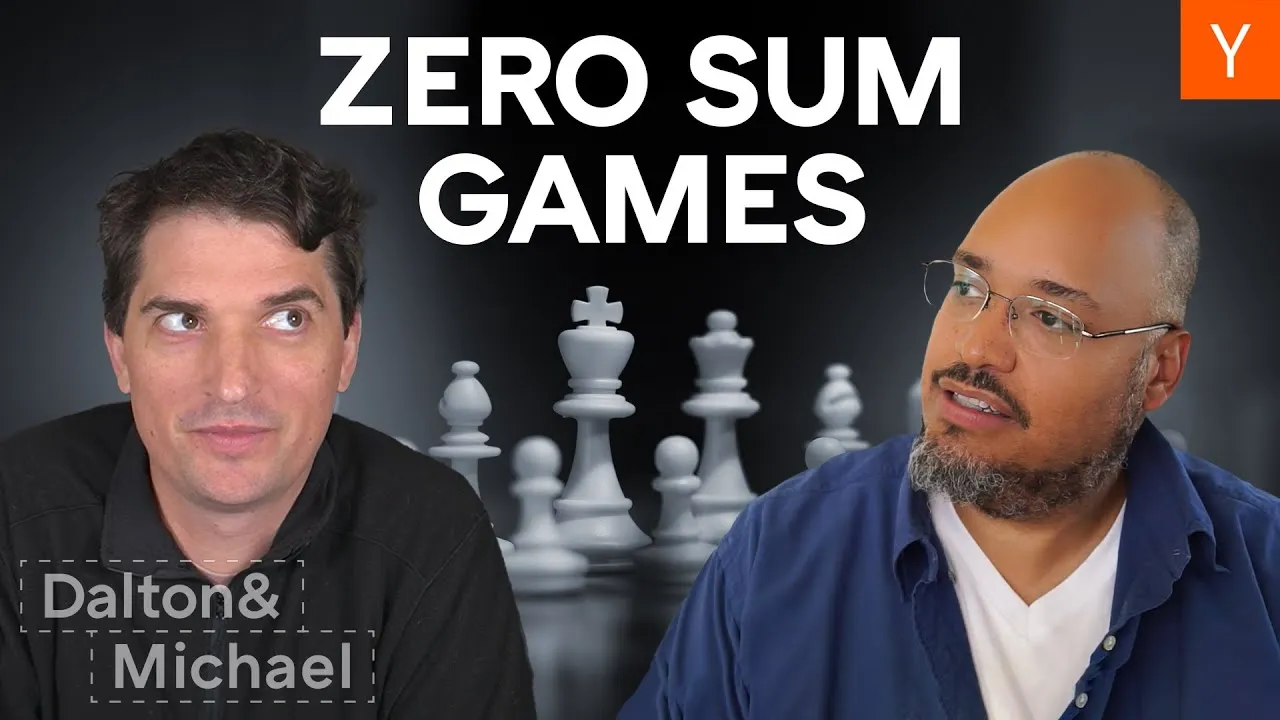Table of Contents
Zero-sum games trap entrepreneurs in destructive cycles where winning requires others to lose, while positive-sum thinking creates lasting value for everyone involved.
Timeline Overview
- 00:00–08:30 — Defining the Game: Clear distinction between zero-sum games where one person's gain equals another's loss versus positive-sum games that create lasting value for everyone involved
- 08:30–18:45 — The Psychology of Gambling: How zero-sum activities exploit human brain flaws similar to sugar and social media, leading people toward manipulation and confidence games that feel rewarding but destroy long-term success
- 18:45–28:20 — Historical Financial Predators: Early 1900s banking practices where institutions legally sold worthless debt to uninformed Americans, demonstrating how zero-sum games can operate within legal frameworks while devastating society
- 28:20–38:15 — Modern Market Dynamics: Current examples of how bull markets make people feel smart until downturns reveal who's really playing sophisticated zero-sum games against overconfident retail investors
- 38:15–48:30 — Building Real Value: How successful startups focus on solving genuine customer problems rather than extracting value from market inefficiencies, creating businesses that survive economic downturns through positive-sum principles
- 48:30–58:45 — Legacy and Decision Frameworks: Why wealthy people who extract value from others end up unhappy, and how the "legacy test" helps entrepreneurs choose value creation over wealth extraction from less informed participants
Key Takeaways
- Zero-sum games extract value from others while positive-sum games create new value that benefits everyone
- Gambling mentality in business leads to quick wins followed by devastating losses with no learning
- Financial markets often reward zero-sum thinking in the short term but destroy long-term societal value
- Successful startups solve real problems, creating positive-sum outcomes that persist through economic downturns
- Legacy thinking helps entrepreneurs choose value creation over wealth extraction from less informed participants
- Positive-sum relationships and businesses compound benefits while zero-sum interactions create negative feedback loops
- Smart money often profits from retail investors who mistake bull markets for personal intelligence
- Building houses beats betting money—tangible value creation trumps speculative wealth transfer every time
Understanding the Game Theory Behind Business Success
The fundamental difference between zero-sum and positive-sum games shapes every aspect of entrepreneurial success. In zero-sum scenarios, your gains come directly from another player's losses—like poker, where money simply changes hands without creating new value. When you win twenty dollars betting with a friend, that money exits their pocket and enters yours with no net value creation for society.
Positive-sum games operate differently. When two people collaborate to build a house, their combined effort produces something lasting that wasn't there before. The house generates rental income, provides shelter, and creates tangible value that extends beyond the immediate participants. This distinction matters because positive-sum activities compound benefits over time while zero-sum interactions merely redistribute existing resources.
The challenge for entrepreneurs lies in recognizing these patterns across different contexts. Stock trading often resembles gambling more than value creation, especially when participants chase momentum without understanding underlying business fundamentals. Meanwhile, companies solving genuine customer problems engage in positive-sum activities that create mutual benefit regardless of broader market conditions.
Gambling represents the purest form of zero-sum thinking, where winning depends entirely on others losing. The house always profits because they've structured the game to extract value from participants over time. This same dynamic appears throughout business when companies profit by exploiting information asymmetries rather than creating genuine value for customers.
The Psychology Behind Zero-Sum Traps
Human psychology contains inherent flaws that make zero-sum games dangerously attractive. The prospect of disproportionate wins without corresponding effort triggers ancient reward circuits that evolved when finding a dead buffalo represented massive fortune without the risk of hunting. Modern gambling exploits these same neural pathways, creating addictive cycles that feel rewarding despite being ultimately destructive.
Social media, sugar, and nicotine operate through similar mechanisms—they provide immediate gratification while delivering long-term negative consequences. Zero-sum games tap into these same psychological vulnerabilities, making them feel good in the moment while eroding sustainable success over time. People become addicted to the rush of quick wins without recognizing the inevitable losses that follow.
The poker mindset exemplifies how zero-sum thinking can corrupt broader behavior patterns. Poker rewards manipulation and deception as core strategies for success. Players learn to exploit others' weaknesses and extract value through psychological manipulation rather than value creation. These skills can easily transfer outside the game, leading people to approach business relationships and transactions with the same exploitative mindset.
Intelligence becomes dangerous when it creates a sense of superiority that justifies taking advantage of others. Some entrepreneurs fall into the trap of believing their intelligence entitles them to profit from less sophisticated participants. This thinking leads down a slippery slope where moral considerations become secondary to winning at all costs. The free market system can inadvertently encourage this behavior by rewarding outcomes regardless of methods.
Historical Examples of Zero-Sum Financial Destruction
Early twentieth-century American banking provides stark examples of how zero-sum thinking can devastate entire societies. Before modern financial regulations, banks routinely sold worthless debt instruments to unsuspecting Americans while fully understanding these investments would fail. The banks profited handsomely from transaction fees while ordinary citizens lost their savings when foreign governments defaulted on their obligations.
These practices weren't illegal at the time, demonstrating how zero-sum games can operate within legal frameworks while still causing massive societal harm. Banks possessed superior information about debt quality but used this advantage to extract wealth from less informed participants rather than creating genuine value. The resulting financial crises eventually forced regulatory changes because the damage to society became unsustainable.
Modern financial markets continue exhibiting similar patterns during speculative bubbles. When "stocks only go up" becomes conventional wisdom, intelligent money positions itself to profit when gravity inevitably reasserts itself. Retail investors mistake bull market conditions for personal genius, often leveraging themselves heavily just before market reversals. The smart money profits by playing a more sophisticated zero-sum game against overconfident amateurs.
The current environment demonstrates these dynamics clearly. People observe others getting rich through seemingly effortless means and experience fear of missing out that drives them toward speculative behavior. However, when markets turn negative, the same people who thought they were smart discover they were actually the marks in someone else's zero-sum strategy. The system doesn't protect them because they voluntarily entered a game they didn't fully understand.
Building Positive-Sum Businesses That Last
Successful entrepreneurs instinctively recognize the difference between gambling and building something real. They focus on solving genuine customer problems rather than extracting value from market inefficiencies or information asymmetries. These businesses create mutual benefit—customers receive valuable solutions while companies generate sustainable revenue streams that can persist through economic downturns.
The external validation test provides a reliable framework for evaluating business models. Positive-sum businesses can clearly articulate the lasting value they create and identify specific ways their work makes customers better off. If your success requires someone else to lose, you're probably engaged in a zero-sum activity that will eventually face unsustainable headwinds. Sustainable businesses create value that persists even when external conditions change.
Current market conditions reveal which companies operate on positive-sum principles. Startups solving real problems continue growing and serving customers despite challenging fundraising environments and economic uncertainty. Their value creation doesn't depend on favorable market sentiment or easy access to capital. Meanwhile, companies that thrived purely on speculation and hype struggle when external conditions shift because they never built genuine value-creation engines.
Relationships within successful companies also follow positive-sum principles. Great partnerships and friendships create mutual enhancement where one plus one equals three. Both parties become better versions of themselves through the relationship, generating compound benefits that extend far beyond the immediate interaction. This same dynamic applies to business partnerships, employee relationships, and customer interactions in thriving organizations.
Legacy Thinking and Long-Term Decision Making
Wealth without meaning creates profound unhappiness that money cannot solve. Many financially successful people discover that accumulating resources through zero-sum games leaves them feeling empty and concerned about their legacy. They realize that making money and making impact represent fundamentally different activities, with only the latter providing lasting satisfaction and self-worth.
The legacy test offers powerful guidance for difficult decisions. When facing challenging choices, imagine explaining your decision to your children or employees who look up to you for guidance. Would you encourage them to pursue the same path? If the answer creates discomfort, you're probably considering a zero-sum option that conflicts with your deeper values and long-term interests.
Most people contribute positively to society through their daily work and family responsibilities, even in seemingly ordinary roles. The person who works diligently at their job and raises children with strong values participates in society-building activities that create lasting positive impact. However, some wealthy individuals realize they've spent their careers extracting value from others rather than contributing to collective progress, creating existential regret that money cannot heal.
Society progresses when positive-sum thinkers create more value than zero-sum players extract from the system. During periods when extraction exceeds creation, everyone suffers through financial crises and social instability. The most fulfilling path involves joining the team that builds society rather than the team that harvests from others' work. This choice creates both personal satisfaction and beneficial externalities that extend far beyond individual success.
Building something lasting requires patience and conviction when others appear to be getting rich quickly through speculation. The friend who only shares his gambling wins while staying silent about losses represents a common pattern that creates misleading impressions about zero-sum success rates. Those who look closely often discover that apparent winners aren't actually cashing out or building sustainable practices—they're drinking their own propaganda until market forces eventually catch up with reality.
Choose positive-sum interactions across all areas of life, from business partnerships to romantic relationships to career decisions. Life remains short, and energy invested in value creation compounds in ways that cannot be predicted or measured. The externalities of positive-sum thinking create ripple effects that benefit countless people while building personal fulfillment that money alone cannot provide.





